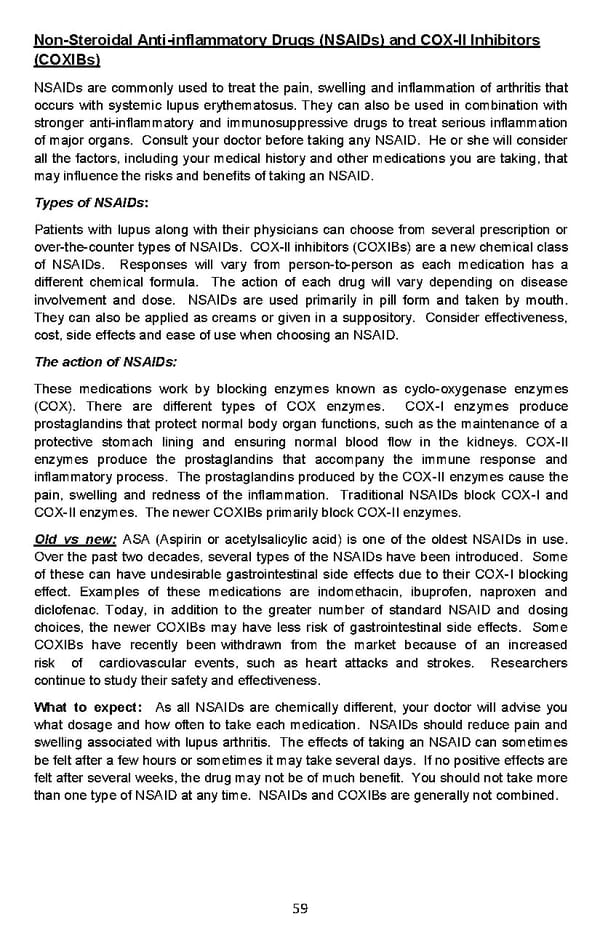Non-Steroidal Anti-inflammatory Drugs (NSAIDs) and COX-ll Inhibitors (COXIBs) NSAIDs are commonly used to treat the pain, swelling and inflammation of arthritis that occurs with systemic lupus erythematosus. They can also be used in combination with stronger anti-inflammatory and immunosuppressive drugs to treat serious inflammation of major organs. Consult your doctor before taking any NSAID. He or she will consider all the factors, including your medical history and other medications you are taking, that may influence the risks and benefits of taking an NSAID. Types of NSAIDs: Patients with lupus along with their physicians can choose from several prescription or over-the-counter types of NSAIDs. COX-ll inhibitors (COXIBs) are a new chemical class of NSAIDs. Responses will vary from person-to-person as each medication has a different chemical formula. The action of each drug will vary depending on disease involvement and dose. NSAIDs are used primarily in pill form and taken by mouth. They can also be applied as creams or given in a suppository. Consider effectiveness, cost, side effects and ease of use when choosing an NSAID. The action of NSAIDs: These medications work by blocking enzymes known as cyclo-oxygenase enzymes (COX). There are different types of COX enzymes. COX-I enzymes produce prostaglandins that protect normal body organ functions, such as the maintenance of a protective stomach lining and ensuring normal blood flow in the kidneys. COX-II enzymes produce the prostaglandins that accompany the immune response and inflammatory process. The prostaglandins produced by the COX-II enzymes cause the pain, swelling and redness of the inflammation. Traditional NSAIDs block COX-I and COX-II enzymes. The newer COXIBs primarily block COX-II enzymes. Old vs new: ASA (Aspirin or acetylsalicylic acid) is one of the oldest NSAIDs in use. Over the past two decades, several types of the NSAIDs have been introduced. Some of these can have undesirable gastrointestinal side effects due to their COX-I blocking effect. Examples of these medications are indomethacin, ibuprofen, naproxen and diclofenac. Today, in addition to the greater number of standard NSAID and dosing choices, the newer COXIBs may have less risk of gastrointestinal side effects. Some COXIBs have recently been withdrawn from the market because of an increased risk of cardiovascular events, such as heart attacks and strokes. Researchers continue to study their safety and effectiveness. What to expect: As all NSAIDs are chemically different, your doctor will advise you what dosage and how often to take each medication. NSAIDs should reduce pain and swelling associated with lupus arthritis. The effects of taking an NSAID can sometimes be felt after a few hours or sometimes it may take several days. If no positive effects are felt after several weeks, the drug may not be of much benefit. You should not take more than one type of NSAID at any time. NSAIDs and COXIBs are generally not combined. 59
 Living Well With Lupus Facts Booklet Page 58 Page 60
Living Well With Lupus Facts Booklet Page 58 Page 60